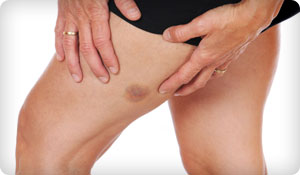
Have you ever stepped out of the shower, caught a glimpse of yourself in a full-length mirror, and wondered, "How in the world did I get that?" That would be a bruise, shining purply through your skin in all its glory. You don't remember bumping into or hitting anything. So how did you get this unsightly mark? And what does it mean?
Usually, the appearance of a bruise or mark on the skin is nothing serious. Most bruises, whether you remember getting them or not, resolve on their own. Bruising occurs when small blood vessels called capillaries are broken because of impact. Capillaries sit just below the surface of your skin, so blood leaks out of the vessels and pools just beneath your skin. Early bruises are red and purple, but as a bruise resolves it may take on a greenish tint as the blood is slowly being reabsorbed into your body. Generally, a hard impact will cause a bigger bruise that you'll probably notice instantly, but small impacts may cause bruises that you don't necessarily see or feel at the time.
Playground and tricycle bang-ups can cause bruising in kids, of course, but the condition becomes more common as you get older. Why? One reason is that your capillaries are aging, and this causes thinner vessel walls. The tissues supporting tje capillaries also weaken with age. A second reason is that your skin itself thins with age. The fatty layer beneath the skin that may have protected you from bruising in your youth diminishes, leaving your skin more vulnerable to minor trauma.
One thing you may want to consider if you're finding yourself covered in splotches is whether medication is making you prone to bruises. Aspirin and other blood-thinning drugs can contribute to bruising because it takes longer for blood to clot while on them. This slow clotting allows more blood than usual to leak out following a minor capillary break.
Can bruising be serious? Sometimes bruising can be a marker of an underlying disease. Call your doctor if you:
- Suddenly start to bruise when you rarely did before (this is especially important if you're on a new drug)
- Develop very large or painful bruises
- Are bruising easily and also are experiencing bleeding elsewhere, as in the nose, mouth, or bowels
- Start bruising while you're sick, especially if you're running a fever or are feeling confused





